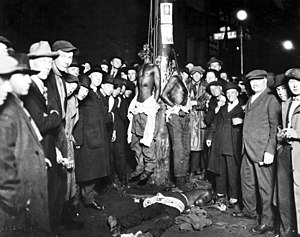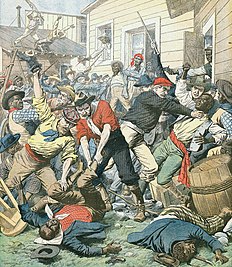
Back Lynchmorde von Duluth German Linchamientos de Duluth Spanish Lynchage de 1920 à Duluth French Linciaggio di Duluth del 1920 Italian Линчевание в Дулуте Russian Duluth lynchings SIMPLE Lynchningarna i Duluth 1920 Swedish
| Duluth lynchings | |
|---|---|
| Part of the Nadir of American race relations | |
 | |
| Location | Duluth, Minnesota |
| Target | Six arrested suspects |
| Victims | Elias Clayton, Elmer Jackson, and Isaac McGhie |
| Perpetrators | Mob (estimated 1,000 - 10,000 participants) |
| Motive | The alleged rape of Irene Tusken |
| Part of a series on the |
| Nadir of American race relations |
|---|
 |
On June 15, 1920, three African-American circus workers, Elias Clayton, Elmer Jackson, and Isaac McGhie, suspects in an assault case, were taken from the jail and lynched by a White mob of thousands in Duluth, Minnesota. Rumors had circulated that six Black men had raped and robbed a nineteen-year-old White woman.
The 1920 lynchings are the only known widely recorded lynching of African-Americans in Minnesota. Twenty other lynchings were recorded in Minnesota, whose victims included mainly Native Americans and Whites.[1] Three men were convicted of rioting, but none served more than fifteen months. No one was ever prosecuted for the murders.
The state of Minnesota passed anti-lynching legislation in April 1921, and lynchings have not been recorded in Minnesota since.[1] In 2003, the city of Duluth erected a memorial to the lynched men.[2] In 2020, Max Mason, who was a co-worker in the same traveling circus as the three men who were lynched, was convicted in court after the lynchings, was granted the first posthumous pardon in the history of the state.[3]
- ^ a b Ziebarth, Marilyn (Summer 1996). "Judge Lynch in Minnesota" (PDF). Minnesota History. 55 (2): 72. Archived (PDF) from the original on May 10, 2022. Retrieved February 27, 2017.
- ^ Kraker, Dan (June 15, 2013). "Duluth marks anniversary of memorial to 3 lynching victims". www.mprnews.org. Archived from the original on March 1, 2016. Retrieved February 19, 2016.
- ^ Cite error: The named reference
onepardonedwas invoked but never defined (see the help page).